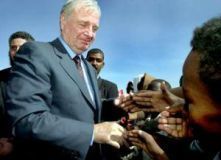Handful of Canadian troops to don UN blue berets in Sudan
By STEPHEN THORNE
OTTAWA, Feb 9, 2005 (CP) — The Canadian Forces will send 19 soldiers to war-torn Sudan as soon as the United Nations begins its mission, possibly spearheading a larger Canadian commitment later on, Defence Department officials confirm.

|
|
Canadian Prime Minister Paul Martin visited Sudan in November 2004. |
I think you will see (more) Canadian troops in Sudan before the year is out,” a highly placed military source told The Canadian Press. “No one really knows details at this point.” A spokeswoman for Defence Minister Bill Graham said she was not aware of any long-term plans to boost Canada’s military commitment in Sudan.
Nor were sources at the military’s co-ordinator of overseas deployments.
But after Prime Minister Paul Martin visited Sudan in November, he said Khartoum’s claim that it’s powerless to rein in militias and halt 21 months of violence simply won’t wash.
A peace accord was signed Jan. 5, but violence continues.
Martin has offered to dramatically boost aid to the 700 African peacekeepers in the country by increasing Ottawa’s contribution of chartered helicopters to 18 from five at a cost of $13.4 million.
Canada is also sending $1.17 million in military supplies, including 2,200 body-armour vests and helmets, and is contributing $2.5 million to the World Food Program in Sudan.
Two of the 19 Canadian officers will be posted with African Union troops in the Sudanese capital Khartoum and Addis Ababa, Ethiopia; 17 will join the UN Multinational Standby High-Readiness Brigade, a quick-response unit commanded by Canadian Brig.-Gen. Greg Mitchell.
The latter group, which has included two Canadian soldiers in Sudan for seven months, will be based in Khartoum, said navy Lieut. Joseph Frey.
The UN mission was approved in late January, but there is no firm deployment date yet.
The decision coincides with the end of a one-year stand-down by Canada’s military, during which Canadians were withdrawn from Bosnia, Haiti and Afghanistan and Canada’s overseas troop commitment was reduced by more than half.
Sudan would fit the federal government’s stated policy to get more involved in humanitarian, peacemaking and peacekeeping operations. It has promised to recruit 5,000 additional soldiers for just that purpose.
“This is the way past missions have gone – small incremental steps, and as the problem worsens the commitment grows,” the military source said on condition of anonymity.
The source indicated any such commitment would likely come after the brigade’s initial six-month deployment and a large-scale training exercise in October involving 3,000 to 4,000 Canadian troops in Wainwright, Alta.
Canada has served with the blue-beret quick-response brigade once before, sending 300 soldiers with Dutch troops to Eritrea in 2001.
On Tuesday, Justice Minister Irwin Cotler said Canada should push the UN Security Council to impose economic sanctions against Sudan because of mass killings in Darfur.
“We must go with economic sanctions and be assured that nothing will block humanitarian aid,” Cotler said, adding aerial bombings must stop and those responsible tried at the International Court of Justice.
More than 70,000 people have died in Darfur, where government militias have attacked both rebels and innocent black citizens. The United States has called it a genocide; the UN describes it as crimes against humanity.
